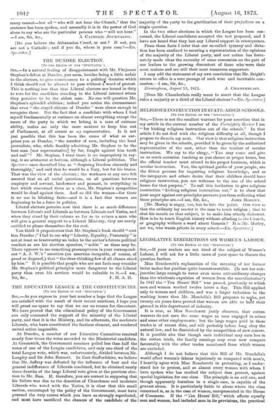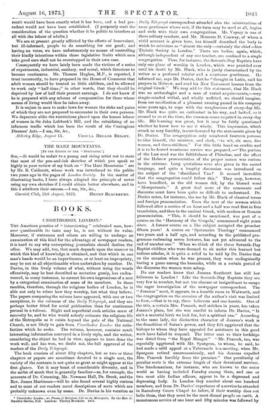LEGISLATIVE RESTRICTIONS ON WOMEN'S LABOUR.
[To THE EDITOR OF THE "SPECTATOR."] SIR,—If your readers are not tired of the subject of Women's Labour, I will ask for a little more of your space to discuss the question farther.
Miss Boucherett's explanation of the meaning of her former letter makes her position quite incontrovertible. (Is not her sub- junctive large enough to cover even more extraordinary changes than the wholesale expulsion of women from the manufactories?) In 1847 the "Ten Hours' Bill" was passed, previously to which men and women worked twelve hours a day. This Bill applied only to women and children, and was a larger reduction in the working hours than Mr. Mundella's Bill proposes to mike, yet twenty-six years have proved that women are able to hold their ground in this department of industry.
It is true, as Miss Boucherett justly observes, that cotton weavers do not earn the same wages as men engaged in mines and some other employments ; but the large wages paid in these trades is of recent date, and will probably before long obey the natural law, and be diminished by the competition of new corners. It is possible also that though each individual may eain less in the cotton trade, the family earnings may even now compare favourably with the other trades mentioned from which women are excluded.
Although I do not believe that this Bill of Mr. Mundella's would affect women's labour injuriously as compared with men's, I heartily agree with Miss Boucherett in protesting, as I under- stand her to protest, and as almost every woman with whom I have spoken who has studied the subject does protest, against special legislation for one class. The principle is an evil one, and though apparently harmless in a single case, is capable of the gravest abuse. It is particularly liable to abuse where the class concerned is, as in the case of women, unrepresented in the House of Commons. If the "Ten Hours' Bill," which affects equally men and women, had included men in its provisions, the practical
result would have been exactly what it has been, and a bad pre- cedent would not have been established. (I purposely omit the consideration of the question whether it be politic to interfere at all with the labour of adults.) We are at present greatly afflicted by the efforts of benevolent, but ill-informed, people to do something for our good ; and having no votes, we have unfortunately no means of controlling their kindly intentions within those legislative limits which men take good care shall not be overstepped in their own case.
Consequently we have lately been made the victims of a series of experiments, industrial, sanitary, and moral, which threatens to become continuous. Mr. Thomas Hughes, M.P., is reported, I trust incorrectly, to have proposed in the House of Commons that adult women should be treated as little children, and be allowed to work only " half-time ;" in other words, that they should be deprived by law of half their present earnings. I do not know if he is prepared with any scheme of compensation for those whose means of living would thus be taken away.
It is unjust in men to make laws for women the risks and pains of which they are not prepared to encounter in their own persons. We deprecate alike the restrictions placed upon the honest labour of women in Sir John Lubbock's Bill, and the subsidising of an infamous traffic which has been the result of the Contagious Diseases' Acts.—I am, Sir, &c., Alderley Edge, August 13. URSULA MELLOR BRIGHT.































 Previous page
Previous page